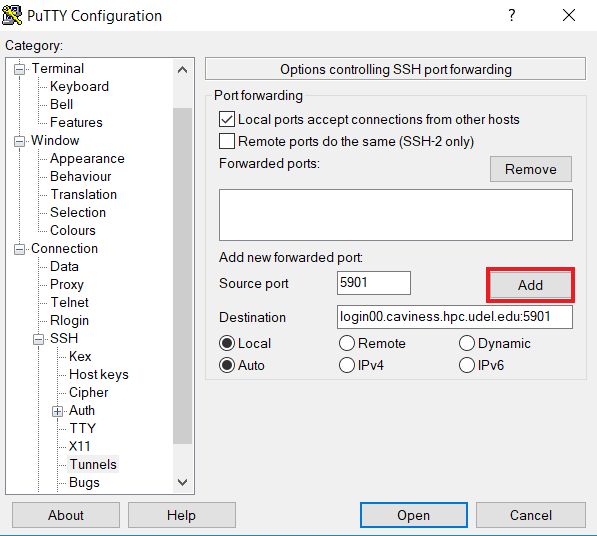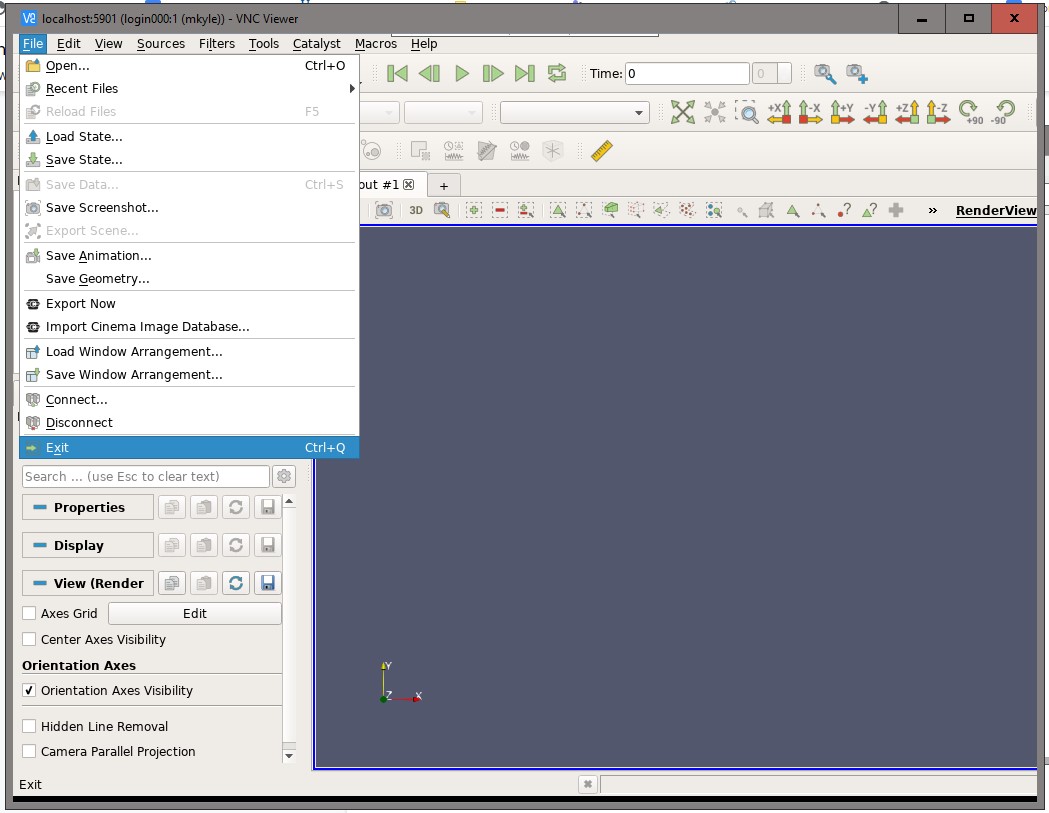This is an old revision of the document!
Paraview on Caviness
Available ParaView Versions
Below is the list of ParaView version available on Caviness as of August 2020. The current default version is 5.8.0
[traine@login00 ~]$ vpkg_versions paraview Available versions in package (* = default version): [/opt/shared/valet/2.1/etc/paraview.vpkg_yaml] paraview ParaView - Open Source Scientific Visualization 5.5.1-1 ParaView binary install with Qt5, MPICH * 5.8.0 Local build with Qt5, Open MPI, various extensions
Setting up ParaView with GUI on Caviness
To use ParaView with a GUI on Cavincess a couple of steps have to be taken. You will need to load the software into your environment, set up the SSH tunnel for VNC to use, and connect to ParaView with VNC software.
Working with ParaView in this method is useful because it creates a more resilient work environment. With this setup if you loose connect to the network you will not loss you work. You simple just need to setup the tunnel again and connect with VNC. After completing those steps, you will find your work just as you left it, before your loss of connection. It is also important that you proper close out on ParaView when you are done using it so that it releases the shared resources it consumes.
Loading ParaView
The below steps will load the ParaView software into your environment.
[traine@login00 ~]$ vpkg_require paraview/5.8.0 Adding dependency `libfabric/1.9.0` to your environment Adding dependency `openmpi/4.0.2` to your environment Adding dependency `intel-python/2020u2:python3` to your environment Adding package `paraview/5.8.0` to your environment (base) [traine@login00 ~]$
Then set run the VNC script, this will setup ParaView's GUI to run with VNC.
(base) [traine@login00 ~]$ paraview-vnc New 'login00:1 (traine)' desktop is login00:1 You will require a password to access your desktops. Password: Verify: New 'login00:1 (traine)' desktop is login00:1 Starting applications specified in /opt/shared/paraview/5.8.0/bin/paraview-xstartup Log file is /home/1201/.vnc/login00:1.log
The base port for VNC is 5900, add your display number :1 (that can be found in the above code segment) and we get 5901.
Setting up SSH Tunuel for VNC Connection
After running the paraview-vnc the GUI you will need to set up tunnel. The steps on how to do this will are shown below for the PuTTY SSH client and Linux/Mac Terminals.
PuTTY
Open PuTTY In addition to your standard connection PuTTY settings you will need to set up the tunnel settings. The image below shows you how this in done in PuTTY. The tunnel setting are found under the Category Connection → SSH → Tunnels
Add the "Source port" and "Destination" as shown in the image above. Once the data is added click the "Add" button. After you add this setting to your session you can save them or just open the session. You will have to leave this session open and open a VNC Client software to start the ParaView GUI on your system.
Linux/Mac
Open a new terminal session on your local machine. Set up a SSH Tunnel using the below ssh command. The base port for VNC is 5900, add your display number :1 and we get 5901.
$ ssh -L 5901:localhost:5901 traine@login00.caviness.hpc.udel.edu
......................................................................
Caviness cluster (caviness.hpc.udel.edu)
This computer system is maintained by University of Delaware
IT. Links to documentation and other online resources can be
found at:
http://docs.hpc.udel.edu/abstract/caviness/
For support, please contact consult@udel.edu
......................................................................
Last login: Thu Aug 6 12:28:19 2020 from c-76-124-88-43.hsd1.de.comcast.net
[traine@login00 ~]$
Setting Up VNC
Now ParaView is running on port 5901 on Caviness. A SSH tunnel is connected on your local machines port 5901 and it is mirroring port 5901 on Caviness. The last step is to set up your VNC client to connect to ParaView on port 5901. These are general steps that should apply to any operating system.
- Open a VNC viewer software.
- Add a new connection to localhost:5901
Connecting to Paraview GUI with VNC
Once the VNC connection is create you can use it to open the ParaView GUI. When connecting you will be asked for a password. This password is the one you set the first time you ran paraview-vnc. Once that password is entered ParaView should open and you can beign working.
Close ParaView GUI on Caviness
It is very important to correctly close out of ParaView when you are done working with it. If ParaView is not closed correctly it then it could continue to use computational resources. To quit ParaView you need to use the GUI. From in the GUI click File→Exit. This will close ParaView in your VNC connection and on Farber. After that you can close you SSH tunnel connection and your Farber SSH session.


